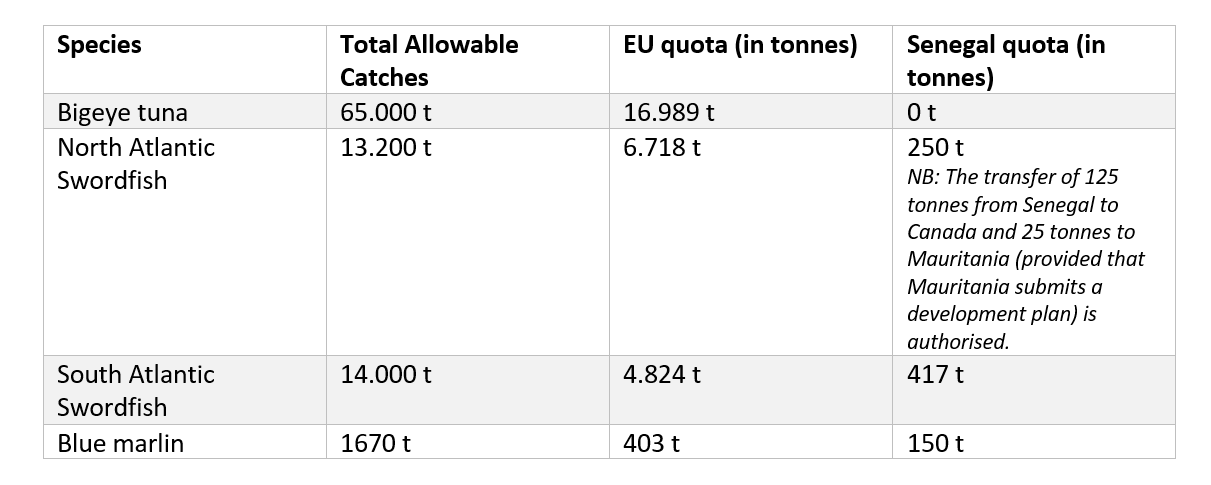In a statement, artisanal fishers criticize misplaced decrying by the local press about the EU-Senegal tuna agreement, and call upon their government to develop Senegalese tuna fisheries for a better access to resources and quotas
This week, the European Parliament approved the European Union-Senegal Sustainable Fisheries Partnership Agreements (SFPA) protocol which will run until 2024. In the wake of the approval of the agreement protocol by the European Parliament, numerous articles have appeared in the Senegalese press crying out for scandal: the agreement would supposedly allow European vessels to plunder thousands of tonnes of resources belonging to Senegal, endangering small-scale fishing, while paying a very modest compensation: 1,700,000 euros per year. To this compensation, a maximum amount of 1,350,750 euros per year will be added, corresponding to the fees due by shipowners if all the tuna vessels come to fish in Senegalese waters.
The African Confederation of Artisanal Fisheries Organisations (CAOPA) issued a statement with the aim to clarify the provisions of the EU-Senegal SFPA but also to call upon the Senegalese government to develop sustainable local tuna fisheries.
Indeed, with the exception of two trawlers fishing for hake, all the vessels that will be fishing through this SFPA are tuna vessels: 28 tuna seiners, 10 pole-and-line tuna vessels and 5 longliners (Spanish, French and Portuguese). Tuna are highly migratory fish species that travel throughout the Atlantic, in the high seas, but also through the Exclusive Economic Zones (EEZ) of African countries bordering the Atlantic, including Senegal.
These tuna species are managed by the International Commission for the Conservation of Atlantic Tunas (ICCAT), which is a Regional Fisheries Management Organisation (RFMO). ICCAT’s role is setting catch limits for a series of tuna species, allocating these resources through quotas among its members who have an interest in these fisheries, and making recommendations for the sustainable management for other tuna species without issuing quotas. For all species, member countries wishing to develop their fisheries must submit a sustainable development plan to ICCAT.
Access to tuna under quotas from Senegal and the EU
Tunas that migrate through Senegalese waters at any time of the year do not belong to Senegal. For those species that are managed by quotas, they “belong” to the countries that have received quotas from ICCAT. For the others, they belong to the countries that fish them.
Under the EU-Senegal SFPA, the tunas caught by EU vessels are yellowfin tuna, skipjack tuna, bigeye tuna, swordfish and blue shark. For yellowfin and skipjack tuna, there is no quota system in ICCAT. Since tuna does not belong to Senegal, the EU, under the SFPA, simply pays a fee to Senegal to access its waters. This means the EU does not pay to catch Senegalese fish, as it does for example in Mauritania or Guinea Bissau. It is also for this reason that the compensation for a tuna agreement is lower than for a “mixed” agreement, where European vessels come to fish resources that belong to the coastal country.
ICCAT quotas for EU and Senegal. Source: Compendium of management recommendations and related resolutions adopted by ICCAT for the conservation of tunas and tuna-like species in the Atlantic 2020.
If there was no agreement with Senegal, European boats would continue to fish this tuna outside Senegalese waters, when they swim on the high seas or in the EEZs of neighbouring countries with which the EU has an agreement, and Senegal would not receive any financial compensation.
Developing local tuna fisheries
Artisanal fisheries organisations ask themselves why Senegal shows so little interest in developing a strong local tuna fishing sector, including artisanal fishing. In the seventies, Senegal had developed a fleet, the SOSAP (Société Sénégalaise d’Armement à la Pêche). However, in the last years, Senegal has not submitted any “ambitious plan for the development of a Senegalese tuna fleet at ICCAT level. For species under quota, Senegal receives only crumbs at ICCAT level.”
CAOPA continues stating they are astonished because Senegal has been a non-contracting cooperating party of the Indian Ocean Tuna Commission (IOTC) since 2006 and also sends Senegalese tuna vessels to fish in Liberian waters. “Wouldn't it be better for Senegal to focus on developing sustainable tuna fishing, including artisanal fishing, in its own waters, rather than leaving tuna fishing largely in the hands of foreign actors, with little benefit to local fisheries?” CAOPA wonders.
CAOPA concludes by requesting the Senegalese government to draw up a sustainable development plan for Senegalese tuna fishing, including artisanal, in consultation with the fisheries sector stakeholders. This plan should be submitted to ICCAT in order to obtain better access to tuna resources.
CAOPA also calls the EU to encourage this reflection at the regional level. Indeed, other fisheries organisations have been asking that, such as Mauritanian fisheries stakeholders. CFFA and CAOPA have been jointly advocating in tuna Regional Fisheries Management Organisations (RFMO) like the IOTC and ICCAT to establish allocation of access systems that prioritise those fishers who fish most sustainably and bring the most social and economic benefits to coastal developing countries members of these RFMOs.
Banner photo: By Victor Rutka - @victorrutka/Unsplash












A Senegalese civil society organisation, member of the OECD Watch network, supported fishers from Saint Louis in placing a complaint to the UK and US OECD National Contact Points against the multinational enterprises British Petroleum and Kosmos Energy.